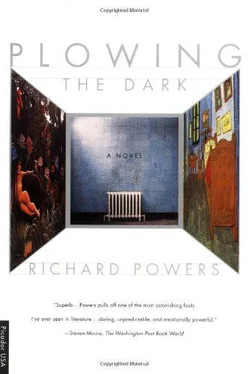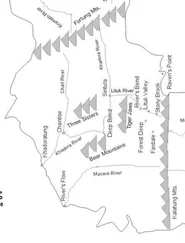Underground, she told Ebesen. Deep in the marl grottos. Nobody will bother looking for them there.
Her island cottage gave her refuge. That summer was the Sound's sunniest in recorded memory. She worked at her columbine and tea roses, bringing them back from weed. She pruned the blackberries and set the crab pots from the dock off her inlet, then sat back and waited for a peace that refused to come. Instead, the sight of those panicked crowds ambushed her, in the surreal hours flanking 2 a.m., when low blood sugar and abetting blackness combined to docent her around her own private Bosch.
Lost, her eye grew stronger. She would sit in the RL's atrium, looking out through its expanse of picture window, gazing down on the unbroken mountainside. She'd sit and squint, applying to this real scene all of Loque's anthology of software filters. She'd work it like the aged Renoir, a brush strapped to his wrists just above the worthless claws. She'd slide a mental adjuster knob from left to right, pulling the whole landscape through discrete, imagined steps from Patinir to Goyen to Ruisdael to Hobbema, on through Kensett and Cole and Bierstadt, then down to Millet, Sisley, or Signac, stopping only when the light started to fail.
This scenic outlook became her private outpost, a place where she could be among people yet not have to look at them. From a hundred yards away, she caught sight of a leaf fat with July's solar spoon-feeding, and saw in it the sprig that Stevie had grown for her, so long ago. She stared for hours out this picture window on the unearthly convolutions of nature's prototype, the only view large enough to erase the human.
One afternoon, on the downward slope of summer, she sat surveying that people-free Barbizon. Everywhere across the landscape's panel, life cast its filaments. She watched a northern flicker lift off a branch in mid-distance, its ventral gold splash flashing as it took flight. Drawn by her glance, the bird bore straight for the RL. Helpless, she stared as it slammed into the picture window, a feathered fist bouncing off the plate glass with a smack.
At the sickening pop, Adie's body ruptured. She screamed, but nothing came out. She ran pointlessly to the pane. The thing lay on the ground in a broken heap, striped, tawny, stilled.
A smear of grease on the glass marked the impact, like the chalk outline around a corpse. Adie fought the gasps coming out of her, an effort that only made her sound even more like a strangled animal. By luck, Spiegel came across her first. Stevie, she didn't care about. Steve had seen her a lot worse off.
Adie, what's happened? What's wrong?
She pointed to the crumpled sack of taxidermy. The bright crest of red in the grass.
Spiegel looked at the window smudge. Aiy. A hard hit Innocence always hit hardest. He glanced behind them, into the expanse of room. Confused by the atrium, probably. From out there, it must look like more of the same.
My fault. My fault.
Your…? Now, how in creation do you—?
I saw it coming. I… I drew it…
Adie. He put his arm around her. She neither let him nor refused.
They stared down at the dead thing, appealing the verdict. Absurdly, the bird chose that exact moment to come to life again. It flapped once or twice, thumping on the ground.
Then it found its gears, lifted up, and followed some remembered angle of incidence back to its delayed errand.
Oh Jesus, Spiegel laughed. Would you look at that.
Brute animal persistence. Adie followed the escape, incredulous. She gathered herself in. It should have died.
Spiegel broke off cackling and stared. He took his arm from her shoulder. I'm sorry? It should have what?
Better off dead than that. You saw how it flew off? More sky, as if nothing at all had changed.
Ade, it's a bird. A bird, for Christ's sake. A second ago, you were grieving for it.
She shook her head, insistent. There were worse things to be killed by than false distances. Worse things to die of than naïveté.
In imagination's room, all things work out.
This is the place's guiding rule. Nothing gets in that doesn't already fit. No twist of plot, except what is slated.
In this room, nothing bleeds. Nothing rots. Nothing breaks. There is pain here, but there is no suffering. Things do grow, but never past their prime. All local flesh has learned that lizard trick of regeneration. The cheetah takes no more than half the antelope's flank. Then the sacrifice grows back again.
Grizzlies stand in the rapids, swiping at stray salmon. But they fish more for sport than out of real need. Theirs is strictly a catch and release. The fish, too, understand the game, the pure run of it, there being no strong line between loss and win. They leap free, teasing, or go belly-up, surrender a pound like a tree sheds fruit, then drift back downstream to try their luck again tomorrow.
The politics of watering holes resolves itself through negotiation. Dogs still fight for their place in the pack's pyramid, but every Omega will have his day. Ant colonies still go to glorious war, although their fronts remain static. Soldiers give their lives to the cause, and the giving completes them.
Every accident has its repair. Nests crumble in the wind, just to gratify the oriole's need to rebuild. Unfledged chicks still blow to the ground, injured. But some benevolent biped ultimately returns them to their high, woven safety.
The people in this room grow up to become what they've always dreamed of being. The human economy teems with doctors and firemen. Oil bubbles up in the back yards of tar-paper shacks. Lost children find their parents again, after many harrowing adventures. Abused orphans wind up adopted by kind uncles and aunts.
Lovers quarrel, slam down the receiver, swear off each other, remember everything, and call each other back laughing in embarrassment. Widowers receive nightly visits from their mates' ghosts. Lonely souls, locked in their own timidity, finally write each other letters, three days before it would have been too late.
All countries move steadily toward democratic free markets. Poor nations catch spark, enjoying the advantages of the late starter. Growth is everywhere export-driven, yet all lands enjoy a favorable balance of trade. Disease yields new insights into how the body works. Someone invents the solar-powered car. Someone discovers how to extract energy from tepid water.
Zealots, on the road to some mass persecution, fall down blind and rise ecumenical. Hotbeds of factionalism succumb to improvements in communication.
Music here heads through the occasional passing dissonance. But always, by cadence, it finds its way back to Do. Revolutions in style still build upon the past. Art constantly refreshes itself, and the occasional harshness, after years of study, proves to be beauty by another name. Lost cantatas now and then come to light. The stolen panel of the Just Judges turns up in a Carthusian monastery.
Age-old mysteries at last get solved in court. Criminals come across life-changing novels in prison, bold-stroked tales that show what still lies ahead of them to accomplish. Each day ends in some illustrative sunset, shattering or subtle.
But this room can't brook any depth or width. Dimension is already too degraded to sustain. This room leaves no place to sit and absorb it. No spot where any outsider might just gaze. Even the weight of a solid glance would tip it, wreck this room's precarious equilibrium.
This is the room to which dying people retire. This is the room from which infants are taken to be born.
This is the soul's balanced window box, the domain of finished poems.
Читать дальше












